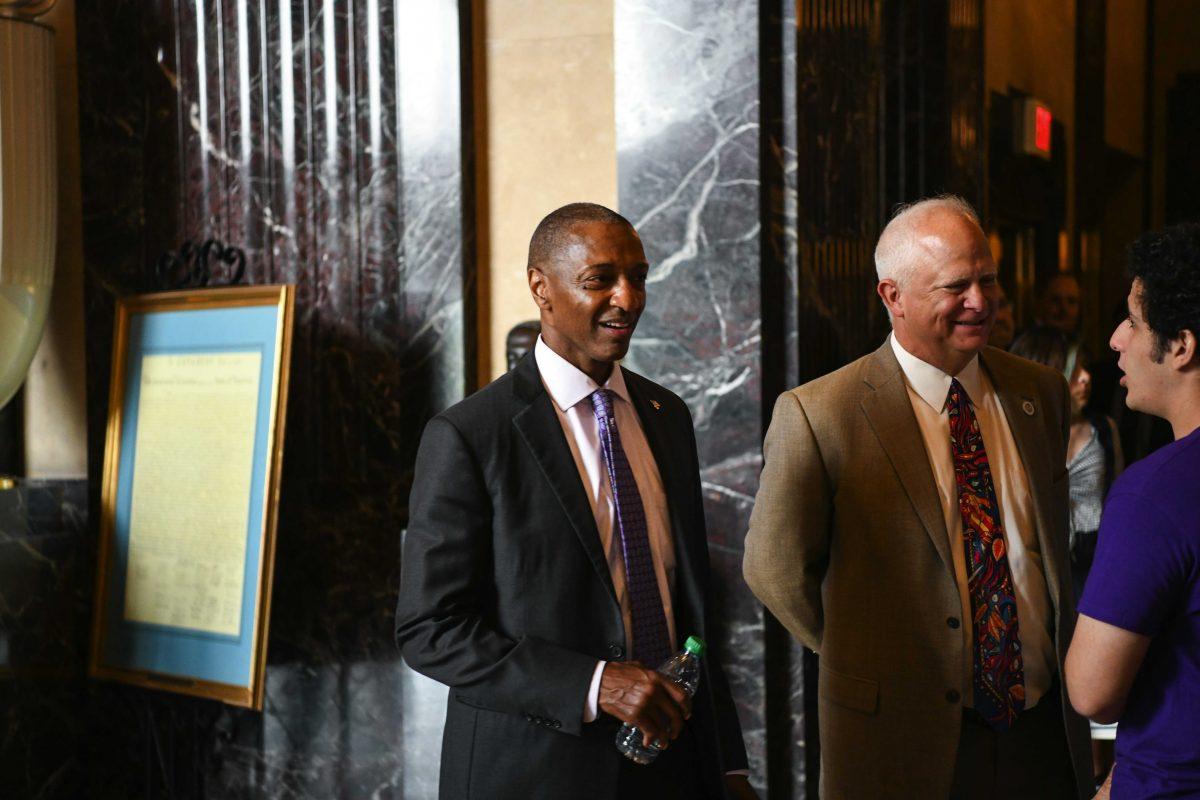Late last month Forbes named LSU President William Tate IV one of its “10 Black higher ed CEOs to watch in 2023.”
To some around campus, perhaps, the honor comes as a surprise. Those who have paid attention to LSU under Tate’s tenure know that the president’s administration has been marked by controversies and infrastructure – some Tate’s fault, and some not.
It’s not Tate’s fault, for instance, that LSU’s previous president, F. King Alexander, and Louisiana’s previous governor, Bobby Jindal, left our state’s flagship university in a poor condition, complete with serious financial difficulties and infrastructural decay; it isn’t Tate’s fault that the state Legislature and the Board of Regents largely determine LSU’s annual budget; nor is he to blame for recent tragedies, such as the death of Madison Brooks, who was allegedly raped and then struck by a car, that occurred in the surrounding Baton Rouge community.
Which isn’t to say that Tate is powerless in his response or in his policy in reaction to these issues, but it is to say that he by no means caused them–a fact that we should recognize.
But there are certainly other things for which Tate does need to take at least some responsibility.
One of these areas is the focus of Tate’s heralded “Scholarship First Agenda,” which aims to bring grant and scholarship money for LSU, broadly speaking–something that is all well and good, if it focused on the university as a whole instead of what it effectively does: only bring in money for STEM-related programs.
Thus far Shell has donated $27.5 million; the state Legislature has allotted $12 million for a brand-new artificial intelligence computer; and the Louisiana Children’s Medical Center and Our Lady of the Lake Medical Center has committed $245 million to help keep LSU students and athletes healthy.
Noticeably absent is anything resembling substantial funding for the humanities or social sciences.
Another was Tate’s unwarranted criticism of this paper, the Reveille, whose coverage Tate called “negative”–an inappropriate thing for a university president to do. Though Tate has since apologized for his remarks, there is a noticeable stain on his reputation among some student journalists at LSU, at least many of the ones I’ve talked with.
Yet another was the university’s refusal to renew a contract with Sexual Trauma Awareness and Response, or STAR, an organization committed to “serving youth and adult survivors of sexual trauma and building institutional capacity to prevent and respond responsibly to sexual violence in the Baton Rouge community, according to its website.”
This move particularly came back to bite Tate’s administration in his public response to the death of LSU freshman Madison Brooks, which the College Democrats of Louisiana State University called “tone-deaf” and “victim blaming.” In a public statement by the LSU chapters of Feminists in Action and the College Democrats of LSU, Tate was said to perpetuate LSU’s “rape culture” and of using “alcohol as a scapegoat.”
The list of problems could continue: LSU’s lack of parking spaces, the university’s shady multi-million-dollar betting deal with Caesar’s Sportsbook, and the school’s subsequent advertising of gambling opportunities to underage students; repeated Title IX issues; or Tate’s lack of support for tenure.
With all these in mind, why and how does Tate receive his recognition by Forbes?
According to one anonymous professor, who was asked to “grade” Tate on his performance at LSU thus far, the explanation for Tate’s public accolades compared to the felt, mixed results on campus, thinks it is due to the president’s ability to use his PR team to his personal advantage:
Tate gets an “A+ for turning the president’s office/system office into a PR operation almost solely devoted to burnishing his image and making him more attractive for a better-paying, more prestigious president’s job somewhere else,” the professor said Meanwhile, he gets a “C- for his refusal to advocate on behalf of faculty free speech-academic freedom, especially his unfortunate and ill-advised decision to endorse the study committee on tenure proposed by the state Senate’s most outspoken critic of tenure,” the professor said.
In other words, the explanation for Tate’s public, compared to his actual, success is that he simply good at producing an immaculate public persona in which he exhibits all the markers of an efficient 21st century university regime–a picture that isn’t representative of reality.
Whether or not this analysis is representative of Tate’s intentions is unknowable; we can’t peer into Tate’s mind to unveil what exactly his motivations are for any given decision he makes, or the specific reasons for his choice to brand himself in the way that he has to the public.
But what we can do is judge the positive and negatives of Tates’ tenure as president of LSU. And it’s safe to say that the results are mixed: Though riddled with pre-existing and self-inflicted problems, Tate has also done several good things, such as raising graduate student pay through the Provost’s “zero-based budget”, bringing in grant money for the school (even if it isn’t fairly distributed – some money is better than none), as well as a few others.
Ultimately if today was the day that midterm grades had to be submitted, and if Tate’s tenure at LSU was a college course in which he was enrolled, Tate’s grade would be passing–but barely. He has a lot more work to do, it seems, to get his grade up to a level deserving of his public praise.
Benjamin Haines is a 24-year-old graduate student from Shreveport.
Opinion: Grading President Tate’s administration, will he pass?
February 13, 2023
LSU President William F. Tate speaks with others Wednesday, April 20, 2022, during the annual LSU Day at the Capitol at the Louisiana State Capitol in Baton Rouge, La.





